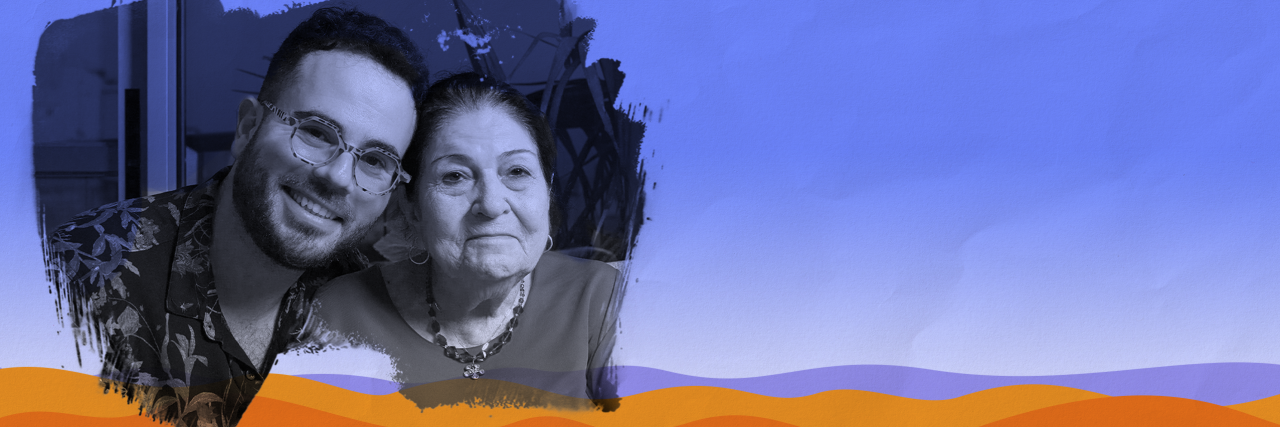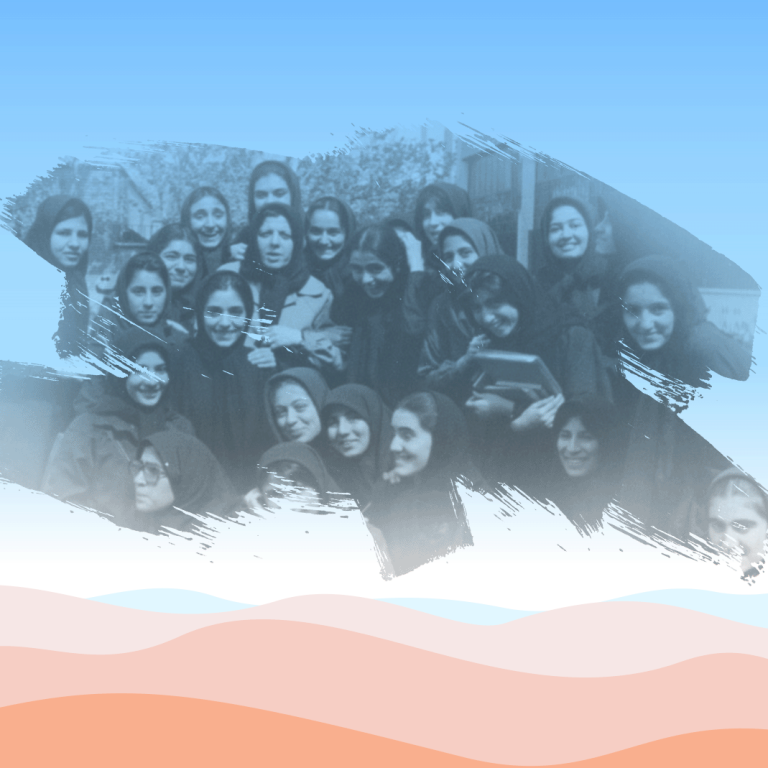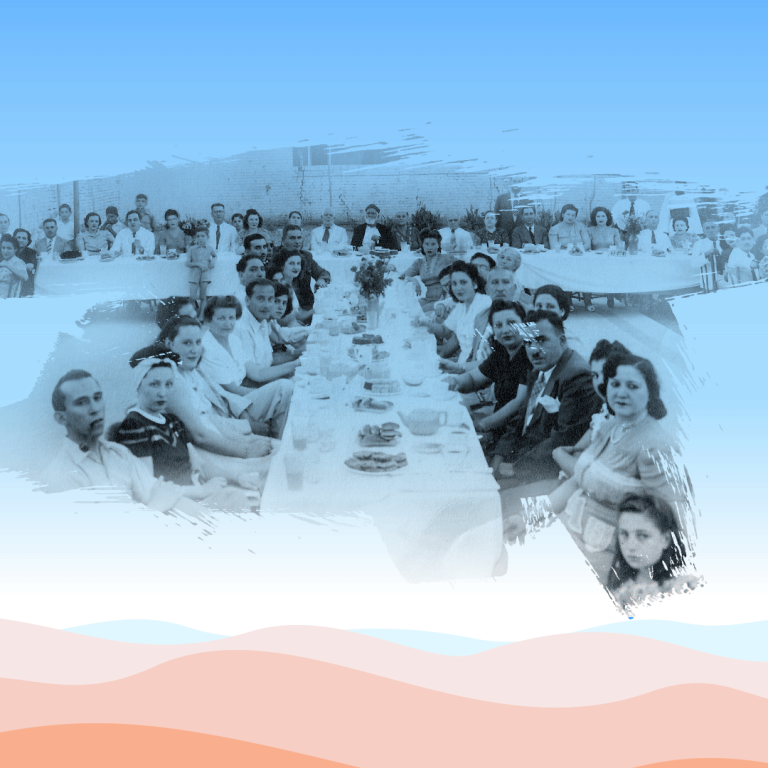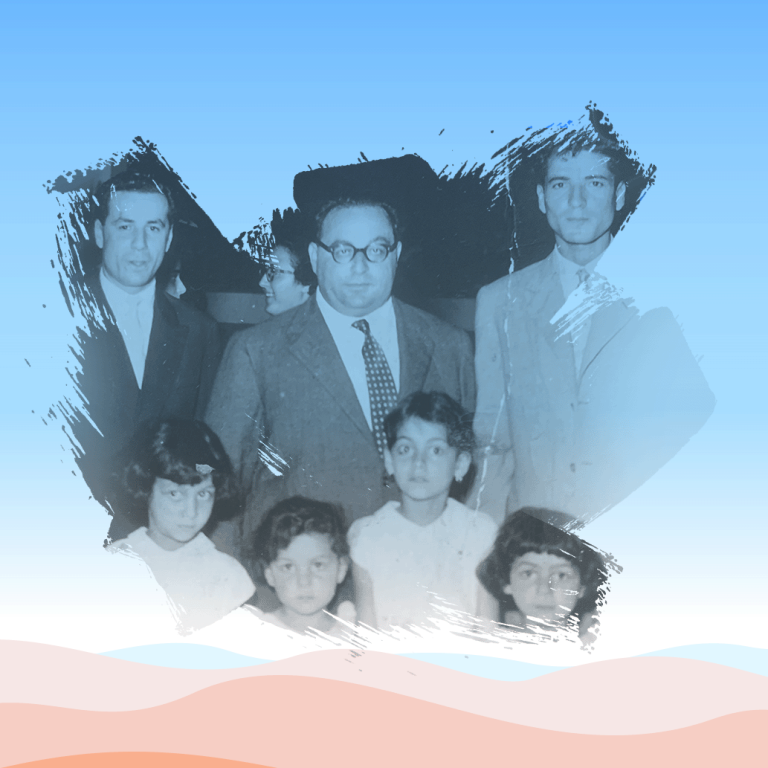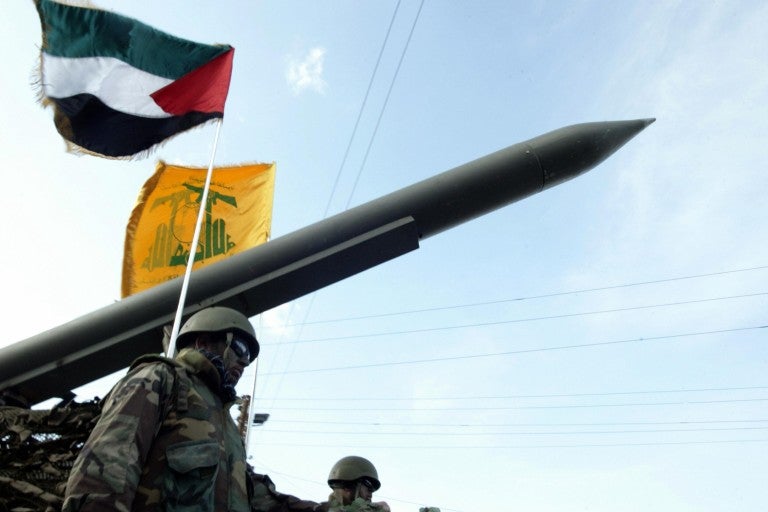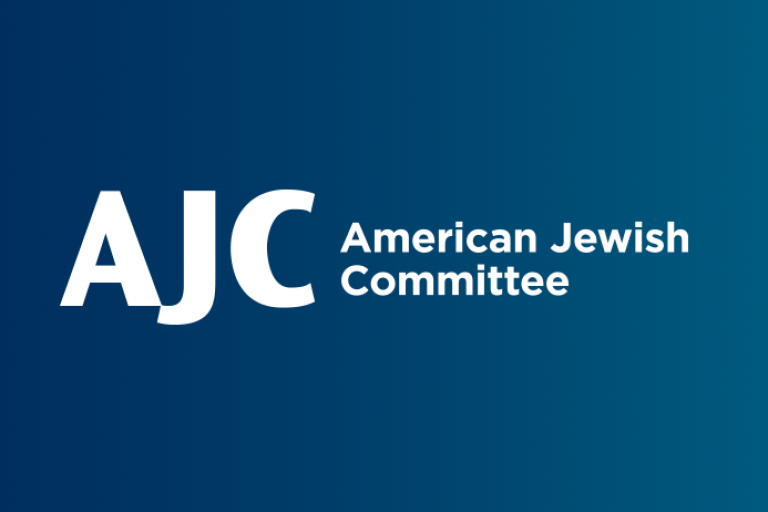August 26, 2024
“In the Israeli DNA and the Jewish DNA, we have to fight to be who we are. In every generation, empires and big forces tried to erase us . . . I know what it is to be rejected for several parts of my identity... I'm fighting for my ancestors, but I'm also fighting for our future generation.”
Hen Mazzig, a writer, digital creator, and founder of the Tel Aviv Institute, shares his powerful journey as a proud Israeli, LGBTQ+, and Mizrahi Jew, in the premiere episode of the second season of the award-winning podcast, The Forgotten Exodus.
Hen delves into his family's deep roots in Tunisia, their harrowing experiences during the Nazi occupation, and their eventual escape to Israel. Discover the rich history of Tunisia's ancient Amazigh Jewish community, the impact of French colonial and Arab nationalist movements on Jews in North Africa, and the cultural identity that Hen passionately preserves today. Joining the conversation is historian Lucette Valensi, an expert on Tunisian Jewish culture, who provides scholarly insights into the longstanding presence of Jews in Tunisia, from antiquity to their exodus in the mid-20th century.
___
Show notes:
Sign up to receive podcast updates here.
Learn more about the series here.
Song credits:
Penceresi Yola Karsi, by Turku, Nomads of the Silk Road
- “Desert Caravans”: Publisher: Pond5 Publishing Beta (BMI), Composer: Tiemur Zarobov (BMI), IPI#1098108837
- “Sentimental Oud Middle Eastern”: Publisher: Pond5 Publishing Beta (BMI), Composer: Sotirios Bakas (BMI), IPI#797324989.
- “Meditative Middle Eastern Flute”: Publisher: Pond5 Publishing Beta (BMI), Composer: Danielyan Ashot Makichevich (BMI), IPI Name #00855552512, United States BMI
- “Tunisia Eastern”: Publisher: Edi Surya Nurrohim, Composer: Edi Surya Nurrohim, Item ID#155836469.
- “At The Rabbi's Table”: Publisher: Pond5 Publishing Beta (BMI), Composer: Fazio Giulio (IPI/CAE# 00198377019).
- “Fields Of Elysium”; Publisher: Mysterylab Music; Composer: Mott Jordan; ID#79549862
- “Frontiers”: Publisher: Pond5 Publishing Beta (BMI); Composer: Pete Checkley (BMI), IPI#380407375
- “Hatikvah (National Anthem Of Israel)”; Composer: Eli Sibony; ID#122561081
- “Tunisian Pot Dance (Short)”: Publisher: Pond5 Publishing Beta (BMI); Composer: kesokid, ID #97451515
- “Middle East Ident”; Publisher: Pond5 Publishing Alpha (ASCAP); Composer: Alon Marcus (ACUM), IPI#776550702
- “Adventures in the East”: Publisher: Pond5 Publishing Beta (BMI) Composer: Petar Milinkovic (BMI), IPI#00738313833.
Episode Transcript:
HEN MAZZIG: They took whatever they had left and they got on a boat. And my grandmother told me this story before she passed away on how they were on this boat coming to Israel.
And they were so happy, and they were crying because they felt that finally after generations upon generations of oppression they are going to come to a place where they are going to be protected, and that she was coming home.
MANYA BRACHEAR PASHMAN: The world has overlooked an important episode in modern history: the 800,000 Jews who left or were driven from their homes in the Middle East and North Africa in the mid-20th century.
Welcome to the second season of The Forgotten Exodus, brought to you by American Jewish Committee. This series explores that pivotal moment in history and the little-known Jewish heritage of Iran and Arab nations.
As Jews around the world confront violent antisemitism and Israelis face daily attacks by terrorists on multiple fronts, our second season explores how Jews have lived throughout the region for generations–despite hardship, hostility, and hatred–then sought safety and new possibilities in their ancestral homeland.
I'm your host, Manya Brachear Pashman. Join us as we explore untold family histories and personal stories of courage, perseverance, and resilience from this transformative and tumultuous period of history for the Jewish people and the Middle East.
The world has ignored these voices. We will not. This is The Forgotten Exodus.
Today's episode: leaving Tunisia.
__
MANYA BRACHEAR PASHMAN: Every June, Hen Mazzig, who splits his time between London and Tel Aviv, heads to Israel to show his Pride. His Israeli pride. His LGBTQ+ pride. And his Mizrahi Jewish pride. For that one week, all of those identities coalesce.
And while other cities around the world have transformed Pride into a June version of the Macy’s Thanksgiving Day Parade, Israel is home to one of the few vibrant LGBTQ communities in the Middle East. Tel Aviv keeps it real.
HEN: For me, Pride in Israel, in Tel Aviv, it still has this element of fighting for something. And that it’s important for all of us to show up and to come out to the Pride Parade because if we’re not going to be there, there’s some people with agendas to erase us and we can't let them do it.
MANYA: This year, the Tel Aviv Pride rally was a more somber affair as participants demanded freedom for the more than 100 hostages still held in Gaza since October 7th.
On that day, Hamas terrorists bent on erasing Jews from the Middle East went on a murderous rampage, killing more than 1,200, kidnapping 250 others, and unleashing what has become a 7-front war on Israel.
HEN: In the Israeli DNA and the Jewish DNA we have to fight to be who we are. In every generation, empires and big forces tried to erase us, and we had to fight. And the LGBTQ+ community also knows very well how hard it is.
I know what it is to be rejected for several parts of my identity. And I don't want anyone to go through that. I don't want my children to go through that. I'm fighting for my ancestors, but I'm also fighting for our future generation.
MANYA: Hen Mazzig is an international speaker, writer, and digital influencer. In 2022, he founded the Tel Aviv Institute, a social media laboratory that tackles antisemitism online. He’s also a second-generation Israeli, whose maternal grandparents fled Iraq, while his father’s parents fled Tunisia – roots that echo in the family name: Mazzig.
HEN: The last name Mazzig never made sense, because in Israel a lot of the last names have meaning in Hebrew.
So I remember one of my teachers in school was saying that Mazzig sounds like mozeg, which means pouring in Hebrew. Maybe your ancestors were running a bar or something? Clearly, this teacher did not have knowledge of the Amazigh people.
Which, later on I learned, several of those tribes, those Amazigh tribes, were Jewish or practiced Judaism, and that there was 5,000 Jews that came from Tunisia that were holding both identities of being Jewish and Amazigh.
And today, they have last names like Mazzig, and Amzaleg, Mizzoug. There's several of those last names in Israel today. And they are the descendants of those Jewish communities that have lived in the Atlas Mountains.
MANYA: The Atlas Mountains. A 1,500-mile chain of magnificent peaks and treacherous terrain that stretch across Algeria, Morocco, and Tunisia, separating the Sahara from the Mediterranean and Atlantic coastline.
It’s where the nomadic Amazigh have called home for thousands of years. The Amazigh trace their origins to at least 2,000 BCE in western North Africa. They speak the language of Tamazight and rely on cattle and agriculture as their main sources of income.
But textiles too. In fact, you’ve probably heard of the Amazigh or own a rug woven by them. A Berber rug.
HEN: Amazigh, which are also called Berbers. But they're rejecting this term because of the association with barbarians, which was the title that European colonialists when they came to North Africa gave them.
There's beautiful folklore about Jewish leaders within the Amazigh people. One story that I really connected to was the story of Queen Dihya that was also known as El-Kahina, which in Arabic means the Kohen, the priest, and she was known as this leader of the Amazigh tribes, and she was Jewish.
Her derrogaters were calling her a Jewish witch, because they said that she had the power to foresee the future. And her roots were apparently connected to Queen Sheba and her arrival from Israel back to Africa. And she was the descendant of Queen Sheba. And that's how she led the Amazigh people.
And the stories that I read about her, I just felt so connected. How she had this long, black, curly hair that went all the way down to her knees, and she was fierce, and she was very committed to her identity, and she was fighting against the Islamic expansion to North Africa.
And when she failed, after years of holding them off, she realized that she can't do it anymore and she's going to lose. And she was not willing to give up her Jewish identity and convert to Islam and instead she jumped into a well and died.
This well is known today in Tunisia. It’s the [Bir] Al-Kahina or Dihya’s Well that is still in existence. Her descendants, her kids, were Jewish members of the Amazigh people.
Of course, I would like to believe that I am the descendant of royalty.
MANYA: Scholars debate whether the Amazigh converted to Judaism or descended from Queen Dihya and stayed.
Lucette Valensi is a French scholar of Tunisian history who served as a director of studies at the School for Advanced Studies in the Social Sciences in Paris, one of the most prestigious institutions of graduate education in France. She has written extensively about Tunisian Jewish culture.
Generations of her family lived in Tunisia. She says archaeological evidence proves Jews were living in that land since Antiquity.
LUCETTE VALENSI: I myself am a Chemla, born Chemla. And this is an Arabic name, which means a kind of belt. And my mother's name was Tartour, which is a turban [laugh].
So the names were Arabic. So my ancestors spoke Arabic. I don't know if any of them spoke Berber before, or Latin. I have no idea. But there were Jews in antiquity and of course, through Saint Augustin.
MANYA: So when did Jews arrive in Tunisia?
LUCETTE: [laugh] That’s a strange question because they were there since Antiquity. We have evidence of their presence in mosaics of synagogues, from the times of Byzantium.
I think we think in terms of a short chronology, and they would tend to associate the Jews to colonization, which does not make sense, they were there much before French colonization. They were there for millennia.
MANYA: Valensi says Jews lived in Tunisia dating to the time of Carthage, an ancient city-state in what is now Tunisia, that reached its peak in the fourth century BCE. Later, under Roman and then Byzantine rule, Carthage continued to play a vital role as a center of commerce and trade during antiquity.
Besides the role of tax collectors, Jews were forbidden to serve in almost all public offices. Between the 5th and 8th centuries CE, conditions fluctuated between relief and forced conversions while under Christian rule.
After the Islamic conquest of Tunisia in the seventh and early eighth centuries CE, the treatment of Jews largely depended on which Muslim ruler was in charge at the time.
Some Jews converted to Islam while others lived as dhimmis, or second-class citizens, protected by the state in exchange for a special tax known as the jizya.
In 1146, the first caliph of the Almohad dynasty, declared that the Prophet Muhammad had granted Jews religious freedom for only 500 years, by which time if the messiah had not come, they had to convert.
Those who did not convert and even those who did were forced to wear yellow turbans or other special garb called shikra, to distinguish them from Muslims.
An influx of Jews expelled from Spain and Portugal arrived in the 14th Century. In the 16th Century, Tunisia became part of the Ottoman Empire, and the situation of Jews improved significantly. Another group who had settled in the coastal Tuscan city of Livorno crossed the Mediterranean in the 17th and 18th centuries to make Tunisia their home.
LUCETTE: There were other groups that came, Jews from Italy, Jews from Spain, of course, Spain and Portugal, different periods. 14th century already from Spain and then from Spain and Portugal. From Italy, from Livorno, that's later, but the Jews from Livorno themselves came from Spain.
So I myself am named Valensi. From Valencia. It was the family name of my first husband. So from Valencia in Spain they went to Livorno, and from Livorno–Leghorn in English–to Tunisia.
MANYA: At its peak, Tunisia’s Jewish population exceeded 100,000 – a combination of Sephardi and Mizrahi.
HEN: When we speak about Jews from the Middle East and North Africa, specifically in the West, or mainly in the West, we're referring to them as Sephardi.
But in Tunisia, it's very interesting to see that there was the Grana community which are Livorno Jews that moved to Tunisia in the 1800s, and they brought the Sephardi way of praying.
And that’s why I always use the term Mizrahi to describe myself, because I feel like it encapsulates more of my identity. And for me, the Sephardi title that we often use on those communities doesn't feel accurate to me, and it also has the connection to Ladino, which my grandparents never spoke.
They spoke Tamazight, Judeo-Tamazight, which was the language of those tribes in North Africa. And my family from my mother's side, from Iraq, they were speaking Judeo-Iraqi-Arabic.
So for me, the term Sephardi just doesn't cut it. I go with Mizrahi to describe myself.
MANYA: The terms Ashkenazi, Sephardi, and Mizrahi all refer to the places Jews once called home.
Ashkenazi Jews hail from Central and Eastern Europe, particularly Germany, Poland, and Russia. They traditionally speak Yiddish, and their customs and practices reflect the influences of Central and Eastern European cultures.
Pogroms in Eastern Europe and the Holocaust led many Ashkenazi Jews to flee their longtime homes to countries like the United States and their ancestral homeland, Israel.
Mizrahi, which means “Eastern” in Hebrew, refers to the diaspora of descendants of Jewish communities from Middle Eastern countries such as: Iraq, Iran, and Yemen, and North African countries such as: Tunisia, Libya, and Morocco. Ancient Jewish communities that have lived in the region for millennia long before the advent of Islam and Christianity. They often speak dialects of Arabic.
Sephardi Jews originate from Spain and Portugal, speaking Ladino and incorporating Spanish and Portuguese cultural influences. Following their expulsion from the Iberian Peninsula in 1492, they settled in regions like North Africa and the Balkans. In Tunisia, the Mizrahi and Sephardi communities lived side by side, but separately.
HEN: As time passed, those communities became closer together, still quite separated, but they became closer and closer. And perhaps the reason they were becoming closer was because of the hardship that they faced as Jews.
For the leaders of Muslim armies that came to Tunisia, it didn't matter if you were a Sephardi Jew, or if you were an Amazigh Jew. You were a Jew for them.
MANYA: Algeria’s invasion of Tunisia in the 18th century had a disproportionate effect on Tunisia’s Jewish community. The Algerian army killed thousands of the citizens of Tunis, many of whom were Jewish. Algerians raped Jewish women, looted Jewish homes.
LUCETTE: There were moments of trouble when you had an invasion of the Algerian army to impose a prince. The Jews were molested in Tunis.
MANYA: After a military invasion, a French protectorate was established in 1881 and lasted until Tunisia gained independence in 1956. The Jews of Tunisia felt much safer under the French protectorate.
They put a lot of stock in the French revolutionary promise of Liberté, égalité, fraternité. Soon, the French language replaced Judeo-Arabic.
LUCETTE: Well, under colonization, the Jews were in a better position. First, the school system. They went to modern schools, especially the Alliance [Israélite Universelle] schools, and with that started a form of Westernization.
You had also schools in Italian, created by Italian Jews, and some Tunisian Jews went to these schools and already in the 19th century, there was a form of acculturation and Westernization.
Access to newspapers, creation of newspapers. In the 1880s Jews had already their own newspapers in Hebrew characters, but Arabic language.
And my grandfather was one of the early journalists and they started having their own press and published books, folklore, sort of short stories.
MANYA: In May 1940, Nazi Germany invaded France and quickly overran the French Third Republic, forcing the French to sign an armistice agreement in June. The armistice significantly reduced the territory governed by France and created a new government known as the Vichy regime, after the central French city where it was based.
The Vichy regime collaborated with the Nazis, establishing a special administration to introduce anti-Jewish legislation and enforce a compulsory Jewish census in all of its territories including Tunisia.
Hen grew up learning about the Holocaust, the Nazis’ attempt to erase the Jewish people. As part of his schooling, he learned the names of concentration and death camps and he heard the stories from his friends’ grandparents.
But because he was not Ashkenazi, because his grandparents didn’t suffer through the same catastrophe that befell Europe, Hen never felt fully accepted.
It was a trauma that belonged to his Ashkenazi friends of German and Polish descent, not to him. Or so they thought and so he thought, until he was a teenager and asked his grandmother Kamisa to finally share their family’s journey from Tunisia. That’s when he learned that the Mazzig family had not been exempt from Hitler’s hatred.
In November 1942, Tunisia became the only North African country to come under Nazi Germany’s occupation and the Nazis wasted no time.
Jewish property was confiscated, and heavy fines were levied on large Jewish communities. With the presence of the Einsatzkommando, a subgroup of the Einsatzgruppen, or mobile killing units, the Nazis were prepared to implement the systematic murder of the Jews of Tunisia. The tide of the war turned just in time to prevent that.
LUCETTE: At the time the Germans came, they did not control the Mediterranean, and so they could not export us to the camps. We were saved by that. Lanor camps for men in dangerous places where there were bombs by the Allies. But not for us, it was, I mean, they took our radios. They took the silverware or they took money, this kind of oppression, but they did not murder us.
They took the men away, a few families were directly impacted and died in the camps. A few men. So we were afraid. We were occupied. But compared to what Jews in Europe were subjected to, we didn't suffer.
MANYA: Almost 5,000 Jews, most of them from Tunis and from certain northern communities, were taken captive and incarcerated in 32 labor camps scattered throughout Tunisia. Jews were not only required to wear yellow stars, but those in the camps were also required to wear them on their backs so they could be identified from a distance and shot in the event they tried to escape.
HEN: My grandmother never told me until before she died, when she was more open about the stories of oppression, on how she was serving food for the French Nazi officers that were occupying Tunisia, or how my grandfather was in a labor camp, and he was supposed to be sent to a death camp in Europe as well. They never felt like they should share these stories.
MANYA: The capture of Tunisia by the Allied forces in May 1943 led the Axis forces in North Africa to surrender. But the country remained under French colonial rule and the antisemitic legislation of the Vichy regime continued until 1944. Many of the Vichy camps, including forced labor camps in the Sahara, continued to operate.
Even after the decline and fall of the Vichy regime and the pursuit of independence from French rule began, conditions for the Mazzig family and many others in the Tunisian Jewish community did not improve.
But the source of much of the hostility and strife was actually a beacon of hope for Tunisia’s Jews. On May 14, 1948, the world had witnessed the creation of the state of Israel, sparking outrage throughout the Arab world. Seven Arab nations declared war on Israel the day after it declared independence.
Amid the rise of Tunisian nationalism and its push for independence from France, Jewish communities who had lived in Tunisia for centuries became targets. Guilty by association. No longer welcome. Rabbinical councils were dismantled. Jewish sports associations banned. Jews practiced their religion in hiding. Hen’s grandfather recounted violence in the Jewish quarter of Tunis.
HEN: When World War Two was over, the Jewish community in Tunisia was hoping that now that Tunisia would have emancipation, and it would become a country, that their neighbors and the country itself would protect them.
Because when it was Nazis, they knew that it was a foreign power that came from France and oppressed them. They knew that there was some hatred in the past, from their Muslim neighbors towards them.
But they also were hoping that, if anything, they would go back to the same status of a dhimmi, of being a protected minority. Even if they were not going to be fully accepted and celebrated in this society, at least they would be protected, for paying tax. And this really did not happen.
MANYA: By the early 1950s, life for the Mazzig family became untenable. By then, American Jewish organizations based in Tunis started working to take Jews to Israel right away.
HEN: [My family decided to leave.] They took whatever they had left. And they got on a boat. And my grandmother told me this story before she passed away on how they were on this boat coming to Israel.
And they were so happy, and they were crying because they felt that finally after generations upon generations of oppression of living as a minority that knows that anytime the ruler might turn on them and take everything they have and pull the ground underneath their feet, they are going to come to a place where they are going to be protected. And maybe they will face hate, but no one will hate them because they're Jewish.
And I often dream about my grandmother being a young girl on this boat and how she must have felt to know that the nightmare and the hell that she went through is behind her and that she was coming home.
MANYA: The boat they sailed to Israel took days. When Hen’s uncle, just a young child at the time, got sick, the captain threatened to throw him overboard. Hen’s grandmother hid the child inside her clothes until they docked in Israel. When they arrived, they were sprayed with DDT to kill any lice or disease, then placed in ma’abarot, which in Hebrew means transit camps. In this case, it was a tent with one bed.
HEN: They were really mistreated back then. And it's not criticism. I mean, yes, it is also criticism, but it's not without understanding the context. That it was a young country that just started, and those Jewish communities, Jewish refugees came from Tunisia, they didn't speak Hebrew. They didn't look like the other Jewish communities there. And while they all had this in common, that they were all Jews, they had a very different experience.
MANYA: No, the family’s arrival in the Holy Land was nothing like what they had imagined. But even still, it was a dream fulfilled and there was hope, which they had lost in Tunisia.
HEN: I think that it was somewhere in between having both this deep connection to Israel and going there because they wanted to, and also knowing that there’s no future in Tunisia. And the truth is that even–and I'm sure people that are listening to us, that are strong Zionists and love Israel, if you tell them ‘OK, so move tomorrow,’ no matter how much you love Israel, it's a very difficult decision to make.
Unless it's not really a decision. And I think for them, it wasn't really a decision. And they went through so much, they knew, OK, we have to leave and I think for the first time having a country, having Israel was the hope that they had for centuries to go back home, finally realized.
MANYA: Valensi’s family did stay a while longer. When Tunisia declared independence in 1956, her father, a ceramicist, designed tiles for the residence of President Habib Bourguiba. Those good relations did not last.
Valensi studied history in France, married an engineer, and returned to Tunisia. But after being there for five years, it became clear that Jews were not treated equally and they returned to France in 1965.
LUCETTE: I did not plan to emigrate. And then it became more and more obvious that some people were more equal than others [laugh]. And so there was this nationalist mood where responsibilities were given to Muslims rather than Jews and I felt more and more segregated.
And so, my husband was an engineer from a good engineering school. Again, I mean, he worked for another engineer, who was a Muslim. We knew he would never reach the same position. His father was a lawyer. And in the tribunal, he had to use Arabic. And so all these things accumulated, and we were displaced.
MANYA: Valensi said Jewish emigration from Tunisia accelerated at two more mileposts. Even after Tunisia declared independence, France maintained a presence and a naval base in the port city of Bizerte, a strategic port on the Mediterranean for the French who were fighting with Algeria.
In 1961, Tunisian forces blockaded the naval base and warned France to stay out of its airspace. What became known as the Bizerte Crisis lasted for three days.
LUCETTE: There were critical times, like what we call “La Crise de Bizerte.” Bizerte is a port to the west of Tunis that used to be a military port and when independence was negotiated with France, the French kept this port, where they could keep an army, and Bourguiba decided that he wanted this port back. And there was a war, a conflict, between Tunisia and France in ‘61.
And that crisis was one moment when Jews thought: if there is no French presence to protect us, then anything could happen. You had the movement of emigration.
Of course, much later, ‘67, the unrest in the Middle East, and what happened there provoked a kind of panic, and there were movements against the Jews in Tunis – violence and destruction of shops, etc. So they emigrated again. Now you have only a few hundred Jews left.
MANYA: Valensi’s first husband died at an early age. Her second husband, Abraham Udovitch, is the former chair of Near Eastern Studies at Princeton University. Together, they researched and published a book about the Jewish communities in the Tunisian island of Djerba. The couple now splits their time between Paris and Princeton. But Valensi returns to Tunisia every year. It’s still home.
LUCETTE: When I go, strange thing, I feel at home. I mean, I feel I belong. My Arabic comes back. The words that I thought I had forgotten come back.
They welcome you. I mean, if you go, you say you come from America, they're going to ask you questions. Are you Jewish? Did you go to Israel? I mean, these kind of very brutal questions, right away. They’re going there. The taxi driver won't hesitate to ask you: Are you Jewish? But at the same time, they’re very welcoming. So, I have no trouble.
MANYA: Hen, on the other hand, has never been to the land of his ancestors. He holds on to his grandparents’ trauma. And fear.
HEN: Tunisia just still feels a bit unsafe to me. Just as recent as a couple of months ago, there was a terror attack. So it's something that’s still occurring.
MANYA: Just last year, a member of the Tunisian National Guard opened fire on worshippers outside El Ghriba Synagogue where a large gathering of Jewish pilgrims were celebrating the festival of Lag BaOmer. The synagogue is located on the Tunisian island of Djerba where Valensi and her husband did research for their book.
Earlier this year, a mob attacked an abandoned synagogue in the southern city of Sfax, setting fire to the building’s courtyard. Numbering over 100,000 Jews on the eve of Israel’s Independence in 1948, the Tunisian Jewish community is now estimated to be less than 1,000.
There has been limited contact over the years between Tunisia and Israel. Some Israeli tourists, mostly of Tunisian origin, annually visit the El Ghriba synagogue in Djerba. But the government has largely been hostile to the Jewish state.
In the wake of the October 7 attack, the Tunisian parliament began debate on a law that would criminalize any normalization of ties with Israel. Still, Hen would like to go just once to see where his grandparents lived. Walked. Cooked. Prayed.
But to him it’s just geography, an arbitrary place on a map. The memories, the music, the recipes, the traditions. It’s no longer in Tunisia. It’s elsewhere now – in the only country that preserved it.
HEN: The Jewish Tunisian culture, the only place that it's been maintained is in Israel. That's why it's still alive. Like in Tunisia, it's not really celebrated. It's not something that they keep as much as they keep here.
Like if you want to go to a proper Mimouna, you would probably need to go to Israel, not to North Africa, although that's where it started. And the same with the Middle Eastern Jewish cuisine. The only place in the world, where be it Tunisian Jews and Iraqi Jews, or Yemenite Jews, still develop their recipes, is in Israel.
Israel is home, and this is where we still celebrate our culture and our cuisine and our identity is still something that I can engage with here.
I always feel like I am living the dreams of my grandparents, and I know that my grandmother is looking from above and I know how proud she is that we have a country, that we have a place to be safe at.
And that everything I do today is to protect my people, to protect the Jewish people, and making sure that next time when a country, when an empire, when a power would turn on Jews we’ll have a place to go to and be safe.
MANYA: Tunisian Jews are just one of the many Jewish communities who, in the last century, left Arab countries to forge new lives for themselves and future generations.
Join us next week as we share another untold story of The Forgotten Exodus.
Many thanks to Hen for sharing his story. You can read more in his memoir The Wrong Kind of Jew: A Mizrahi Manifesto.
Too many times during my reporting, I encountered children and grandchildren who didn’t have the answers to my questions because they’d never asked. That’s why one of the goals of this project is to encourage you to ask those questions. Find your stories.
Atara Lakritz is our producer. T.K. Broderick is our sound engineer.
Special thanks to Jon Schweitzer, Nicole Mazur, Sean Savage, and Madeleine Stern, and so many of our colleagues, too many to name really, for making this series possible.
You can subscribe to The Forgotten Exodus on Apple Podcasts, Spotify, or wherever you listen to podcasts, and you can learn more at AJC.org/theforgottenexodus.
The views and opinions of our guests don’t necessarily reflect the positions of AJC.
You can reach us at theforgottenexodus@ajc.org. If you've enjoyed this episode, please be sure to spread the word, and hop onto Apple Podcasts or Spotify to rate us and write a review to help more listeners find us.
